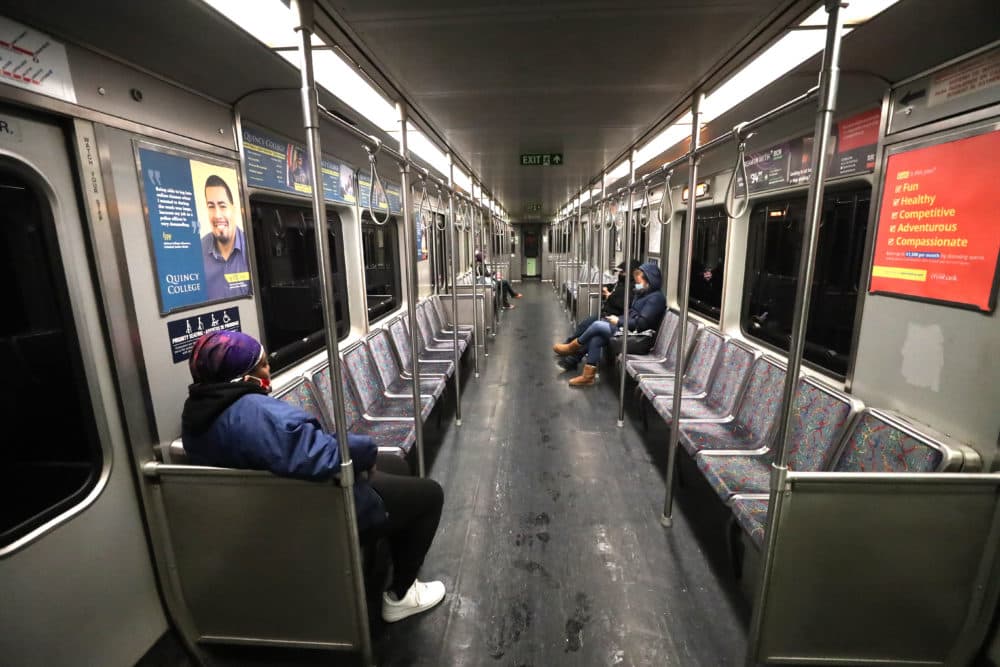Advertisement
T Socks Away Savings, Pays $82M In Overtime While Trimming Service

After another month of faring better financially than budgeted, the MBTA has set aside nearly $71 million in savings since the start of the fiscal year, though officials continue to stick to their plan to cut service on underused lines and consider restoring it later this year.
A recent report also found that the T paid out $82 million in overtime wages last year, despite its budgetary concerns.
The T, which shuttered weekend service on several commuter rail lines and trips on the Charlestown and Hingham ferries starting Saturday, finished November with net revenues of $14.3 million compared to an expected monthly bottom line of negative $5.2 million, General Manager Steve Poftak said. That performance was driven by a combination of decreased spending and better-than-expected sales tax revenue collections, Poftak said.
The surplus revenue will be deposited into a fund the agency created as a bulwark against a massive, pandemic-fueled budget crunch, pushing its balance to $70.8 million. The T will not use that money immediately and will hold it aside until the next fiscal year.
If the rest of fiscal year 2021 — which ends July 1 — plays out as budgeted, the agency will end the spending cycle with $314 million set aside in its temporary savings fund that could get deployed to address an fiscal year 2022 budget gap — estimated at roughly up to $584 million — reverse cuts to bus, rail and ferry service, or effectuate a combination of the two.
Officials at the transit agency had previously aimed to end the fiscal year with between $236 million and $276 million in the deficiency savings bucket to help soften any blow in the next year if ridership is slow to return.
"Right now, if we go according to budget, we'll end up with $314 million available to restore service and fund other operational expenses in [fiscal year 2022]," Poftak said.
Despite the budget woes, a review by the Boston Herald found that the T paid out $82 million dollars in overtime pay to employees in 2020. Fifty employees managed to double or triple their base pay with overtime, 35 workers managed to earn over $100,000 in overtime, and dozens of employees are on track to pad their salaries with six-figure payouts again in 2021, the Herald reported.
In addition, 93 employees earned more than Gov. Charlie Baker through combined salary and overtime pay.
Meanwhile, MBTA General Manager Steve Poftak took a $20,800 bonus on top of his $324,522 salary, according to payroll records.
Like many transit agencies, the MBTA says it has been grappling with a budget crisis inflicted by reduced ridership and fare revenues amid the pandemic. The MBTA Board approved a package of service cuts in December aimed at cutting spending while ridership, still hovering below a third of pre-pandemic levels, is low.
Many lawmakers and advocates have voiced frustration with the T's budgeting approach, arguing that the smaller number of riders still using the system amid a pandemic depend on it the most and are harmed by the changes.
Transportation advocate Chris Dempsey of Transportation for Massachusetts called the budget woes a “manufactured crisis.” The MBTA is in line to receive $1.1 billion in federal stimulus funds, money that has not been factored into the budget gap.
“They are saving it for a future rainy day. We say this is the rainy day,” Dempsey said.
MBTA spokesman Joe Pesaturo told the Herald that overtime costs were necessary to keep the system running in an unprecedented year.
Overtime spending peaked in 2019 at $96.2 million, the 2020 figure is on par with the 2018 figure of $81.9 million.
Charlie Chieppo of the Pioneer Institute said that the out-of-control overtime shows “a lack of basic respect for taxpayers” from an agency that has been plagued by spending scandals.
The agency will receive at least $250 million in federal funding from the latest stimulus package, and as much as $17 million of that will go toward short-term service restorations. Another $178 million will replenish capital funds that were transferred to cover a shortfall, and the rest will be saved until officials decide service levels in the fiscal year 22 budget.
With reporting from The Associated Press and State House News Service's Chris Lisinski